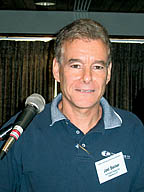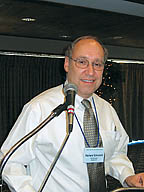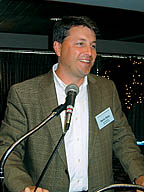SUPPLY HOUSE TIMES' Wholesalers Of The Year - WinWholesale, Dayton, Ohio (2004) and Torrington Supply, Waterbury, Conn. (1999), were featured on a panel at the North Central Wholesalers Association regional convention in June.
The NCWA meeting included members of both the Central Wholesalers Association and Michigan Association of Distributors. The event was held June 13 to 14 at Maumee Bay Resort and Conference Center in Oregon, Ohio, on the shores of Lake Erie.
About 175 attendees registered for the conference, which in addition to the panel of distributors offered tabletop exhibits and the annual banquet.
Here are some highlights from the panel discussion:

Joel Becker, CEO, Torrington Supply
Becker said his company has studied the book “What's Your Plan? Smart Salesforce Compensation in Wholesale Distribution” by J. Michael Marks and Michael Emerson of Indian River Consulting Group, published by the National Association of Wholesaler-Distributors' Distribution and Research Education Foundation (DREF), and applied its guidelines. The book points out that there is no relationship between a company's sales incentive plan and its likely gain or loss in market share, but what matters most is setting an objective, getting management to use it in rating salesperson performance, and making sure the whole team buys in.Torrington Supply is now linking incentive awards to achieving corporate objectives and has set up sales management to provide accountability for performance. It has developed a tiered plan that pays more for desired results.
“The most interesting thing to come out is that it is okay to have a different sales plan for every salesperson,” Becker said.
He also said that his company has shifted its focus to more residential business and is spreading its sales concentration from a few large customers to more smaller customers.

Rick Schwartz, president, WinWholesale
WinWholesale is rolling out a new system to scan invoices, Schwartz said. Today with faster scanners and with disk space being cheaper, information can be verified very quickly without someone having to key it in. “The cost is based on the number of users. Payback is five months against internal costs.”In 2004 WinWholesale processed 1.6 million invoices through its centralized WinWholesale Payable Service Center, of which 31.4% were electronic data interchange (EDI), 15.4% inter-company EDI, and 53.2% were keyed. Currently it is scanning 750 invoices per day in two regions, he said. By September, WinWholesale's centralization schedule projects it will scan 3,000 invoices per day. The company is using Readsoft OCR software and OnBase workflow and Document Management Software. At the present time, 30% of invoices flow directly through OnBase, held only for final review, but the ultimate goal is to increase that to 90%, he said.
Projected cost savings from this initiative is $950,400 annually, or $2,200 per year for each local company, he said.
Among the key factors that make WinWholesale's business model work are low overhead expense, kept as a variable cost; separate profit and loss statements and balance sheets for all branches (local companies); and maximum authority and responsibility moved to the local companies.
“We are a bottom-up company,” he said. “We look at our local companies as the driving force behind our success.”

Martin Ranley, chairman and president, Kendall Electric
The third distributor on the panel was Martin Ranley, chairman and president of Kendall Electric, a large regional electrical distributor based in Battle Creek, Mich., with 33 locations in Michigan and northern Indiana.His company converted to 100% employee-owned in 1999.
“We do 90% of our purchasing dollars via electronic data interchange (EDI),” Ranley said. “EDI is not free. It is a value-added network. You pay by the amount of data you move.”
Industry Data Exchange Association, or IDEA, a joint initiative by the National Electrical Manufacturers Association (NEMA) and Electrical Distributors Association (NAED), has developed the Industry Data Warehouse (IDW), a central database to synchronize product, pricing and packaging data between trading partners, and Industry Data Exchange 2 (IDX2), a private network for the exchange of business documents, primarily EDI but also other formats that can be passed between trading partners.
“There are hundreds of manufacturers and distributors driving e-commerce through this portal,” Ranley said. “Everyone is saving money. To do that well, the data has to be in sync. The data must be certified as accurate. It relates to how we set our prices, how we pay our invoices. It cleans up the whole process.”
